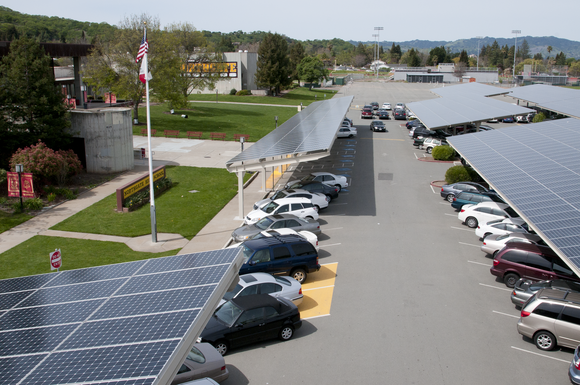Solar And Energy Storage Go Corporate

This article originally appeared in the Motley Fool.
Energy storage is finally becoming a legitimate option for utilities, commercial-building owners, and homeowners across the country. The biggest opportunity in 2018 may be in the commercial market, where the combination of solar and storage can create a cost-savings combo that gives building operators a lot of flexibility to control their energy costs.
Commercial solar projects alone have always struggled to be justifiable financially, because commercial customers' bills typically include a payment for the energy they consume (consumption charge) and another portion based on their peak demand (demand charge). Traditional solar net metering may only reduce half of a customer's bill, but combining solar with energy storage can reduce the cost of both components on utility bills and makes a valuable combo for the renewable-energy industry.
A Leader Emerges In Commercial Solar-Plus-Storage Solutions
Most commercial energy-storage projects in the U.S. have used stand-alone systems like Stem to provide energy-storage solutions. Tesla's (NASDAQ:TSLA) Powerpack was another popular product, but it wasn't paired with SolarCity's commercial solar product in a turnkey solution.
SunPower (NASDAQ:SPWR) is trying its hand at providing a one-stop-shop solution for commercial solar and energy storage, and has a good shot at leading the market. It has long been a leader in commercial solar: It has installed about 1.7 gigawatts of commercial projects around the world and claims the No. 1 market-share position in the U.S.
The turnkey Helix commercial solar solution is now being combined with a product called Helix Storage to make a full solution for customers. SunPower will sell the system as a turnkey solution to installers, and develop some systems itself with large corporate customers. Then SunPower will use its own software and monitoring to control the energy-storage system to generate value.
When installed, Helix Storage will reduce demand charges for customers and even store cheap solar energy for consumption when electricity prices are highest. SunPower says it can leverage the data it's gathered from monitoring 1.7 GW of commercial solar installations to maximize the benefits of solar plus storage in a way competitors will have a hard time matching.
Bringing the solution under one roof will also help with financing. Until now, most commercial solar projects had to be financed separately from energy storage, making both tricky for developers. Bringing them together should make financing and financial justification easier.
A Stepping Stone To Residential Solar
Commercial energy storage is complex in a way that residential energy storage isn't. The algorithm energy-storage companies develop needs to account for on-site consumption needs, solar energy production, time-of-use rates, and demand charges all at once.
When companies roll out residential solar-plus-storage solutions, the requirements won't be nearly as complex. Most residential customers don't have demand charges, so energy storage will just have to maximize for on-site consumption needs and potential changes in time-of-use rates, effectively performing energy arbitrage where possible. So any company that can build a large market share in commercial solar plus storage will likely be able to translate that to residential solar plus storage as well. SunPower's hope is that it'll scale both starting in 2018.

Opening Up A World Of Opportunity
Commercial solar plus storage will start as a way to save companies money on consumption and demand charges, but there could be a world of opportunities opened as installations grow. Virtual power plants could tie thousands of installations together and provide services to the grid, and we may see utilities pay for other services like frequency regulation and demand response. These will make energy storage more viable financially and open up a lot of opportunities for the companies that can build scale in the industry.
Travis Hoium owns shares of SunPower. The Motley Fool has no position in any of the stocks mentioned. The Motley Fool has a disclosure policy.




















